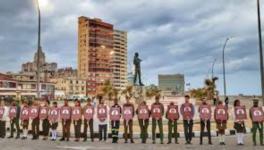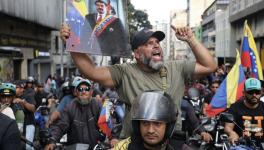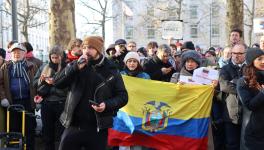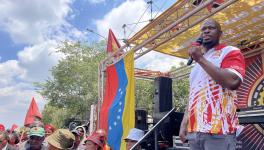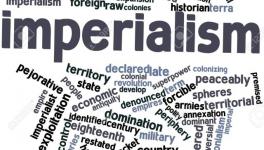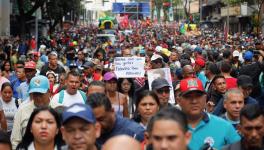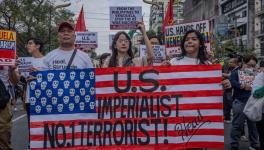Venezuela Celebrates 21 Years of the Bolivarian Revolution
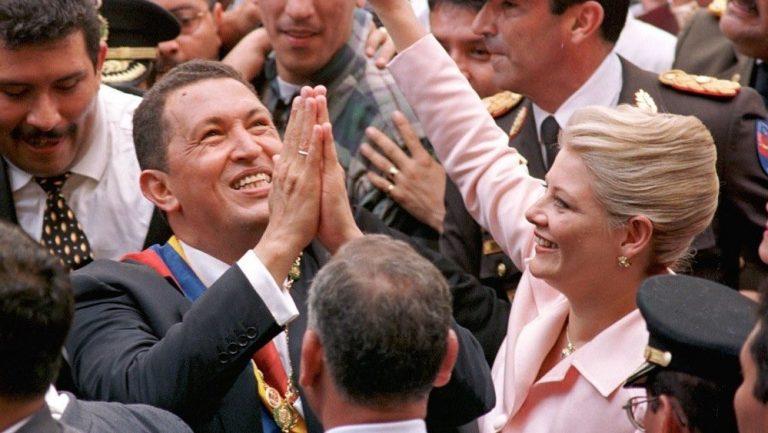
On February 2, 1999, Commander Hugo Chávez was first sworn in as the President of Venezuela and pledged to constitutionally transform the social reality of the country.
This February 2 marked 21 years since Commander Hugo Chávez was first sworn in as the President of Venezuela and pledged to constitutionally transform the social reality of the country. In their commemoration of the 21st anniversary of the Bolivarian Revolution and the swearing-in of Commander Chávez, Venezuelan President Nicolas Maduro and other government officials reiterated their commitment to defend the legacy of Chávez and continue working in defense of democracy, independence, peace, social justice and sovereignty.
“On February 2, Commander Chávez swore by the mandate of the people, transforming Venezuela into a Free and Sovereign Homeland. 21 years later, we became an indomitable force that will never stop the victorious march of the Bolivarian Revolution. Nothing and no one can defeat us!,” tweeted President Maduro.
After winning the presidential elections on December 6, 1998, against Rafael Caldera with the highest percentage of the popular vote in 4 decades: 56.20%, on February 2, 1999, Chávez vowed to democratically reform the 1961 Constitution and lay the foundations for a new inclusive and social constitution.
“I swear before God, I swear before the homeland, I swear before my people that on this dying constitution, I will promote the democratic transformations necessary for the new republic to have a Magna Carta adequate to the new times. I swear,” Commander Chávez vowed to the people on his inauguration day.
The same day, he began the revolutionary process and called for a referendum for the creation of a National Constituent Assembly to write a new Constitution, based on the principles of the Liberator Simón Bolívar: socialism, nationalization and state-led economy. The plebiscite for the drafting of a new Constitution was approved by 87% of the vote. On December 15, 1999, the constitutional draft that established a new social and people-centric model of the state was approved with 71% of the votes. It also renamed the country as the Bolivarian Republic of Venezuela.
Since the beginning of the Bolivarian Revolution, Venezuela has experienced profound social, economic and political changes. Commander Chávez introduced several policies based on the population’s access to food and housing, free health and education, promotion of employment opportunities and the extension of social security.
During the administration of President Chávez, the rate of hunger, poverty and extreme poverty reduced by more than 50% in Venezuela. This was recognized by the the Food and Agriculture Organization of the United Nations (FAO) in 2012. In the same year, the United Nations Economic Commission for Latin America and the Caribbean (UNECLAC) ranked Venezuela as the third country in Latin America with the lowest percentage of poverty.
Higher education and university education became a right of all Venezuelans during Chávez’s rule. It was ranked as the fifth country in the world and the second in Latin America with the highest university enrollment by the United Nations Educational, Scientific and Cultural Organization (UNESCO). Presently, Venezuela is the Latin American country with the third highest literacy rate of 97.1%.
The Bolivarian Revolution created the Ministry of Popular Power for Habitat and Housing, an entity that executes several social programs to provide dignified housing to the Venezuelan working class. Through these programs 10,436,879 homes have been rehabilitated and 30,091,557 families have their own homes.
President Chávez’s government launched several healthcare programs to provide free medical and surgical services to the poorest citizens of the country and built several High Technology Centers to carry out special medical research and studies.
These social programs have been sustained by the current government of the United Socialist Party of Venezuela (PSUV), led by President Maduro, despite the brutal economic sanctions imposed by the United States and its allies against the country.
In addition to these, many other social security programs such as the Local Committees for Supply and Production (CLAP), a house-to-house distribution of basic food products; the Humanized Childbirth Plan, a social program aimed at protecting pregnant women throughout the process of gestation; the Great Housing Mission, a program to provide housing for people who live in precarious conditions; and several youth and students programs providing scholarships, stipends and free food to hundreds of thousands of young Venezuelans; have been introduced by the government of PSUV, continuing the legacy of Commander Chávez.
Get the latest reports & analysis with people's perspective on Protests, movements & deep analytical videos, discussions of the current affairs in your Telegram app. Subscribe to NewsClick's Telegram channel & get Real-Time updates on stories, as they get published on our website.









